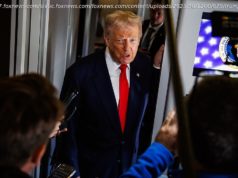A day after declaring that Iran was obeying international restrictions on its nuclear program, the Trump administration went in the opp…
Here’s our look at the Trump administration and the rest of Washington:
A day after declaring that Iran was obeying international restrictions on its nuclear program, the Trump administration went in the opposite direction and slapped new sanctions on the Tehran government for separate alleged transgressions.
The Treasury Department on Tuesday blacklisted 18 individuals and entities for supporting Iran’s military and Revolutionary Guards Corps, accusing them of trying to build ballistic missiles and steal U. S. computer software and of harassing U. S. naval vessels.
The sanctions mean it is illegal for American citizens or companies to do business with those on the list, and any assets they have in the U. S. can be seized.
The back-to-back actions reflect the policy crosscurrents for President Trump in trying to reconcile his campaign promises with the realities of foreign policy governance.
As a candidate, he vowed to «rip up» the 2015 Iranian nuclear deal, which was brokered by the United States with five other countries and the European Union. It required the Islamic Republic to get rid of most of its nuclear material and to refrain from nuclear weapons production for a decade.
The United Nations has repeatedly said Iran is complying.
But the administration has sought a way to thread the needle between not walking away from the deal — which would have potentially disastrous international consequences — and holding Iran accountable for other behaviors, such as its support for militant groups in Lebanon and Yemen.
Iran, along with Russia, also backs Syrian President Bashar Assad, whom the U. S. accuses of numerous atrocities against his citizenry.
«The United States remains deeply concerned about Iran’s malign activities across the Middle East, which undermine regional stability, security and prosperity, » State Department spokeswoman Heather Nauert said Tuesday.
The nuclear agreement’s terms are limited to the nuclear weaponry issue. It does not address Iran’s ballistic missile program or any other aspects of its military activities or human rights record. Diplomats said at the time it would have been impossible to reach the nuclear agreement if the other issues were mixed in.
At a midnight deadline Monday, the Trump administration certified that Iran was complying with the nuclear deal. By law, the U. S. must issue certification every 90 days. This is the second time Trump’s government has done so. It came with last-minute drama this time, as Trump balked at certification — against the wishes of his principal national security advisors, according to by a person close to the White House who spoke on the condition of anonymity to describe the internal debate.
On Monday, after talking points for certifying Iran’s compliance already had been distributed within the administration, Trump told senior advisors he was having second thoughts and wanted other options.
Secretary of State Rex Tillerson came to the Oval Office around 1: 30 p.m. for a previously scheduled and unrelated meeting with Trump, but the discussion was dominated by what to do with the Iran deal.
Tillerson argued that allies needed more notice before stating Iran wasn’ t complying with the deal. Trump national security advisor H. R. McMaster and other senior advisors present, including Gen. Joseph Dunford, chairman of the Joint Chiefs of Staff, also made the case for holding off.
But Steve Bannon, Trump’s strategic advisor who keeps a list of Trump’s campaign pledges on a white board in his White House office, said Trump should follow through with his promise to tear up the deal.
After nearly an hour, Trump agreed to support certification, but demanded a plan for getting tougher on Iran. Facing the midnight deadline to inform Congress, advisors were still were tweaking the wording of the announcement as late as 9: 30 p.m.
Hours after the certification, the administration announced the new sanctions for Iran’s separate actions. The penalties are the latest in a long list of attempts to punish Tehran.
«Iran’s other malign activities are serving to undercut whatever ‘positive contributions’ to regional and international peace and security were intended to emerge from the» nuclear agreement, Nauert said.
Besides Iran’s Revolutionary Guards, the new sanctions target the military’s support of so-called «fast attack boats, » which are the small vessels Iran uses to harass U. S. ships in the region’s waters.
Most of those sanctioned Tuesday were Iranian, but one company is based in Turkey and one individual is a Chinese national.
The sanctions «send a strong signal that the United States cannot and will not tolerate Iran’s provocative and destabilizing behavior, » Treasury Secretary Steven Mnuchin said.
As part of the nuclear accord, numerous international sanctions on Iran were lifted, allowing it to export oil and rejoin the global financial system.
The State Department also reissued calls for the release of U. S. citizens arrested in Iran.






